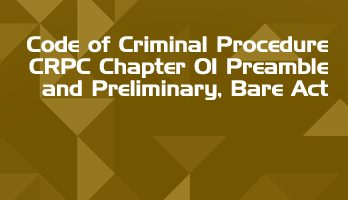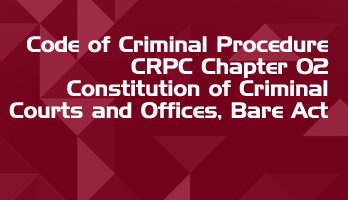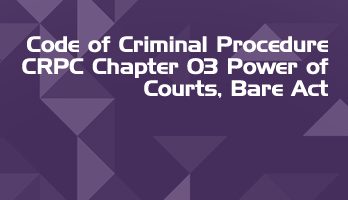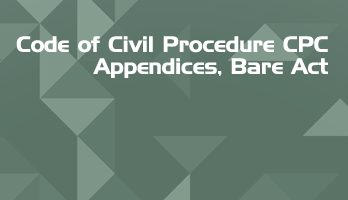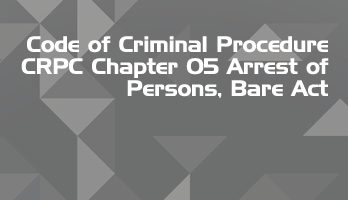A 'Bare act' is the actual legislation passed by the Parliament of India. Generally, an act sets out the high level legal and policy principles applicable to the subject matter of the law.
Most acts are accompanied by 'subsidiary legislation' such as rules, regulations, notifications and orders; which address the actual implementation detail of the act.
Free Full Course Available on LawMint's YouTube Channel
How to Land Your Dream LLB Internship in a Top Law Firm
- Part 1 - Introduction
- Part 2 - Internship Planning
- Part 3 - Internship Research
- Part 4 - Building Your Profile
- Part 5 - The Email
- Part 6 - The Resume
- Part 7 - The Cover Letter
- Part 8 - The Interview
- Part 9 - Self Development
Practical and comprehensive course, with real examples and step-by-step analysis of the complete internship application process. Check out LawMint's YouTube channel now!
Indian Divorce Act, 1869
Chapter II – Jurisdiction
Section 4 – Matrimonial jurisdiction of High Courts to be exercised subject to Act. Exception
The jurisdiction now exercised by the High Courts in respect of divorce a mensa et toro, and in all other causes, suits and matters matrimonial, shall be exercised by such Courts and by the District Courts subject to the provisions in this Act contained, and not otherwise : except so far as relates to the granting of marriage – licenses, which may be granted as it this Act had not been passed.
Section 5 – Enforcement of decrees or orders made heretofore by Supreme or High Court
Any decree or order of the late Supreme Court of Judicature at Calcutta, Madras or Bombay sitting on the ecclesiastical side, or of any of the said High Courts sitting in the exercise of their matrimonial jurisdiction, respectively, in any cause or matter matrimonial, may be enforced and dealt with by the said High Courts, respectively, as herein after mentioned, in like manner as if such decree or order had been originally made under this Act by the Court so enforcing or dealing with the same.
Section 6 – Pending suits
All suits and proceedings in causes and matters matrimonial, which when this Act comes into operation are pending in any High Court, shall be dealt with and decided by such Court, so far as may be, as if they had been originally instituted therein under this Act.
Section 7 – Court to act on principles of English Divorce Court
Subject to the provisions contained in this Act, the High Courts and District Courts shall, in all suits and proceedings hereunder, act and give relief on principles and rules which, in the opinion of the said Courts, are as nearly as may be conformable to the principles and rules on which the Court for Divorce and Matrimonial Causes in England for the time being acts and gives relief: Provided that nothing in this section shall deprive the said Courts of jurisdiction in a case where the parties to a marriage professed the Christian religion at the time of the occurrence of the facts on which the claim to relief is founded.
Section 8 – Extraordinary jurisdiction of High Court
The High Court may, whenever it thinks fit, remove and try and determine as a Court of original jurisdiction any suit or proceeding instituted under this Act in the Court of any District Judge within the limits of its jurisdiction under this Act. Power to transfer suits. Power to transfer suits. – The High Court may also withdraw any such suit or proceeding, and transfer it for trial or disposal to the Court of any other such District Judge.
Section 9 – Reference to High Court
When any question of law or usage having the force of law arises at any point in the proceedings previous to the hearing of any suit under this Act by a District Court or at any subsequent stage of such suit, or in the execution of the decree therein or order thereon, the Court may, either of its own motion or on the application of any of the parties, draw up a statement of the case and refer it, with the Court’s own opinion thereon, to the decision of the High Court. If the question has arisen previous to or in the hearing, the District Court may either stay such proceedings, or proceed in the case pending such reference, and pass a decree contingent upon the opinion of the High Court upon it. If a decree or order has been made, its execution shall be stayed until the receipt of the order of the High Court upon such reference.
Important Central Acts in Regional Languages
Legislative department website also features regional language versions of several important Central Acts.
Free Full Course Available on LawMint's YouTube Channel
How to Land Your Dream LLB Internship in a Top Law Firm
- Part 1 - Introduction
- Part 2 - Internship Planning
- Part 3 - Internship Research
- Part 4 - Building Your Profile
- Part 5 - The Email
- Part 6 - The Resume
- Part 7 - The Cover Letter
- Part 8 - The Interview
- Part 9 - Self Development
Practical and comprehensive course, with real examples and step-by-step analysis of the complete internship application process. Check out LawMint's YouTube channel now!








